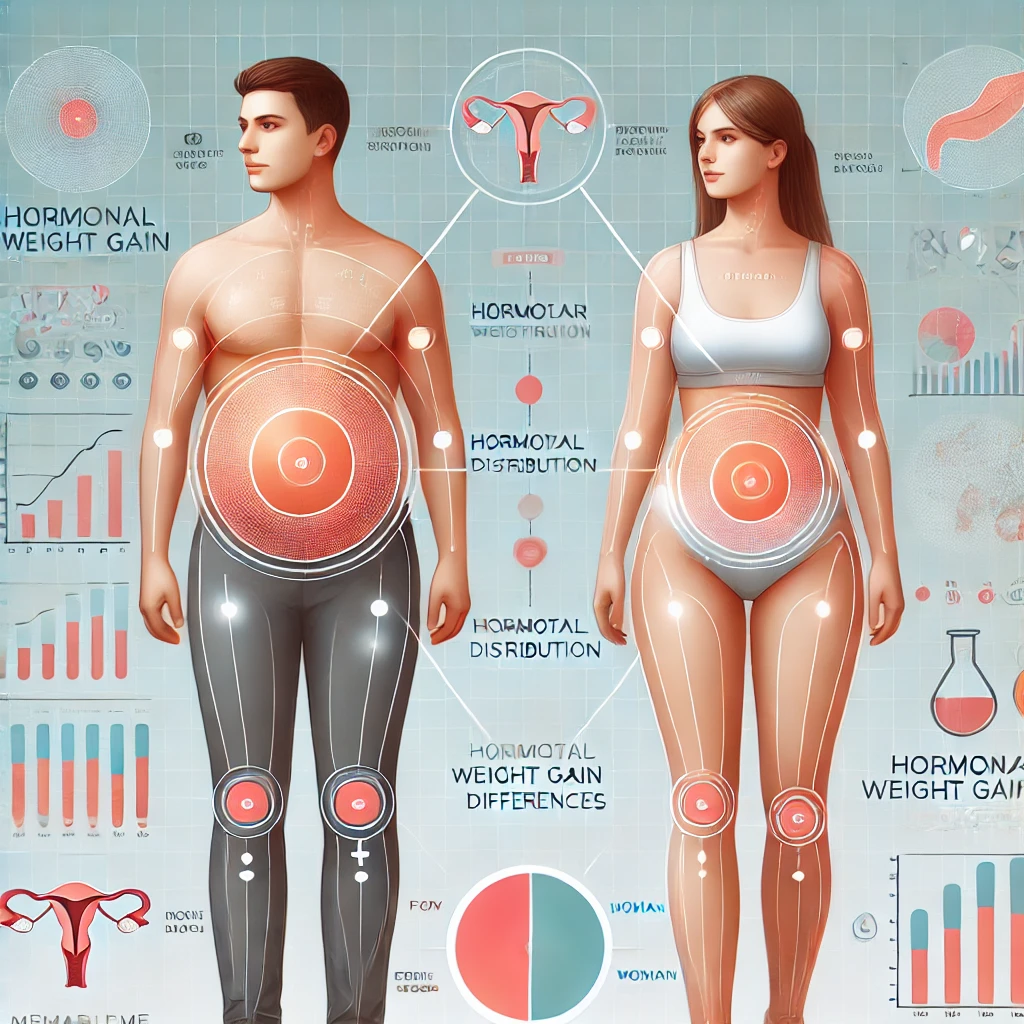
Introduction
Ever wondered why men and women gain weight differently? The answer lies in hormones. These chemical messengers influence metabolism, fat storage, and muscle composition, making weight management unique for each gender. Understanding these hormonal differences can help individuals make better health choices and adopt strategies that work for their bodies.
In this article, we’ll explore the key hormones responsible for weight gain, how they affect men and women differently, and what you can do to manage hormonal weight fluctuations effectively.
1. The Science Behind Weight Gain in Men vs. Women
Men and women store fat differently due to hormonal influences. Women tend to accumulate fat in their hips and thighs, while men are more likely to store excess weight in their abdomen. These differences stem from biological, evolutionary, and hormonal factors:
- Fat Distribution: Estrogen encourages fat storage in the lower body for fertility purposes, while testosterone helps men build muscle and burn fat more efficiently.
- Metabolism: Men typically have a higher muscle mass, leading to a faster metabolism compared to women.
- Energy Storage: Women’s bodies are designed to store more fat to support pregnancy and breastfeeding.
2. Estrogen & Progesterone: How They Affect Women’s Weight
Two key female hormones, estrogen and progesterone, significantly impact weight gain:
- Estrogen: Regulates fat storage, particularly in the hips and thighs. Low estrogen levels (as seen in menopause) can lead to increased belly fat.
- Progesterone: Affects water retention and appetite. Fluctuations during the menstrual cycle can lead to temporary weight gain.
Additionally, pregnancy and menopause cause major hormonal shifts, influencing metabolism and fat distribution.
3. Testosterone’s Role in Men’s Weight Gain
Testosterone plays a crucial role in shaping a man’s body composition:
- Muscle Growth: Higher testosterone levels promote muscle development, which increases metabolism.
- Fat Distribution: Testosterone helps prevent excessive fat accumulation. Low levels, often seen with aging, contribute to belly fat gain.
- Energy Levels: Low testosterone can cause fatigue, reducing physical activity and leading to weight gain.
4. Cortisol & Stress: A Weight Gain Trigger for Both Genders
Cortisol, the body’s primary stress hormone, impacts weight in both men and women:
- Chronic stress increases cortisol levels, leading to abdominal fat accumulation.
- Stress triggers cravings for high-calorie, sugary foods.
- Women often experience more cortisol-related weight gain due to higher stress sensitivity.
Managing stress through exercise, mindfulness, and sleep can help regulate cortisol levels and prevent unnecessary weight gain.
5. Insulin & Blood Sugar: The Hidden Factor in Weight Gain
Insulin is responsible for regulating blood sugar levels, but imbalances can contribute to weight gain:
- Insulin resistance causes the body to store more fat, especially in the belly.
- Women with PCOS (Polycystic Ovary Syndrome) often struggle with insulin-related weight gain.
- Men generally process carbohydrates more efficiently, leading to fewer insulin-related weight issues.
A diet rich in whole foods, fiber, and protein can help regulate insulin levels and support weight management.
6. How Lifestyle Affects Hormonal Weight Gain
Beyond biology, lifestyle factors play a crucial role in hormone balance and weight control:
- Diet: Processed foods and sugar can disrupt hormone levels, leading to weight gain.
- Exercise: Strength training helps boost testosterone in men, while cardio and resistance training help balance estrogen in women.
- Sleep & Gut Health: Poor sleep increases cortisol and ghrelin (the hunger hormone), leading to overeating. A healthy gut microbiome supports hormonal balance and metabolism.
7. Strategies to Manage Hormonal Weight Gain
To prevent and manage hormonal weight gain, consider these tips:
✔ Eat a balanced diet rich in protein, healthy fats, and fiber.
✔ Exercise regularly with a mix of strength training and cardio.
✔ Manage stress through mindfulness, yoga, or deep breathing exercises.
✔ Get quality sleep (7–9 hours per night) to support hormone regulation.
✔ Consider supplements like omega-3s, magnesium, and vitamin D to aid hormonal balance.
Conclusion
Hormones play a vital role in weight gain, and understanding their impact can help both men and women make informed health decisions. While biological differences exist, lifestyle choices significantly influence how hormones affect weight. By maintaining a healthy diet, exercising regularly, and managing stress, you can take control of your hormonal health and achieve long-term weight balance.
Call to Action:
Want to optimize your weight loss based on your hormones? Consult a healthcare professional or nutritionist to create a personalized plan tailored to your body’s unique needs.



